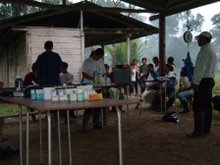
This is the story of another homeless man I interviewed on Skid Row, Pablo. The post's title refers to my previous entry and immigration issues as considered by the major stakeholders--the people. Obviously, this is anything but a homogenous stakeholder group.
Just like Severiano, I met Pablo at the Downtown Drop-in Center in L.A. He was sitting on a boulder at the Center, looking peacefully the street where a prostitute, a policeman, and a man in a wheelchair were gathered. He is staying temporarily at the nearby L.A. Mission, which he describes as “a living hell.” “The slop they give you isn’t sufficient to survive,” he says. “The guards search you three or four times a day. At Salvation Army, they kick you out after a few days, or start charging you ten bucks a night.”
Pablo was born in 1944 in Puerto Rico. He moved to New York in 1948 with his parents and three sisters, and attended primary school there.
“I’ve been working since I was eight years old,” he says. “I started selling fruits and vegetables on the street when I was ten or eleven.”
Pablo remembers Los Angeles thirty years ago, when he first came from the east coast to work in agriculture.
“L.A. was a lot better back then,” he claims. “There were a lot more job opportunities. Nowadays, there’s no work.”
When asked why he thinks there are fewer and fewer jobs in L.A., Pablo—like many politicians in the country—cites the increasing influx of immigrants.
“They’re willing to work for less,” he says. “If I go in asking for a living wage, employers don’t care because they know they can get the job done for less by an immigrant. They’ll find someone else who’ll sacrifice what they need to get money.”
According to Pablo, this is not a new phenomenon. “I was a union cook at a military academy, and after the [Vietnam] war, they told me, ‘We can get it done cheaper.’ They terminated a lot of Americans to bring the Vietnamese in. They brought them to [Fort] Indiantown Gap for cheap labor.”
Pablo also worked in the oil industry, delivering oil to Panama in the late 1980s when citizens went on strike against then-President Noriega. “The U.S. has a lot to do with the pollution of oceans,” he notes. He also worked in Boston, Texas, Washington and Tennessee, doing everything from coffee roasting to waste management. He likes the adventure of travel and the camaraderie that grows from working with fellow men. “You don’t have to look behind your back,” he reflects. “The guy next to you is your father, your brother, your mother. You don’t have time to argue.”
How long has Pablo been homeless? “I’ve been here three weeks,” he tells me. “I’m getting old, I need the sunny weather.” He then goes on to explain his battle to get financial support from the government. “I won it in court,” he claims. “They owe me disability. I can’t work no more after my bypass. I’ve worked all my life. But the government would rather die than give you any money. They never answer the phone and when you go in to see them, they treat you like garbage.”
I ask about Pablo’s plans for the future. “I’m just waiting for my social security to come in,” he says. “821 dollars.” Considering how often he moves around, I wonder how the check will make it to him. “Oh, I have direct deposit.” Once he gets his check, he’ll rent a room for $280 at a nearby hotel.
Pablo isn’t worried about drugs deals and other criminal activity on Skid Row—despite acknowledging rampant drug use, he seems to think it’s pretty safe. “But the government could take care of this if they wanted to. [The police] lock up 30 or 40 people every day for drugs. Nowhere in the world is [the culture of homelessness] as bad as it is here in L.A.”





No comments:
Post a Comment